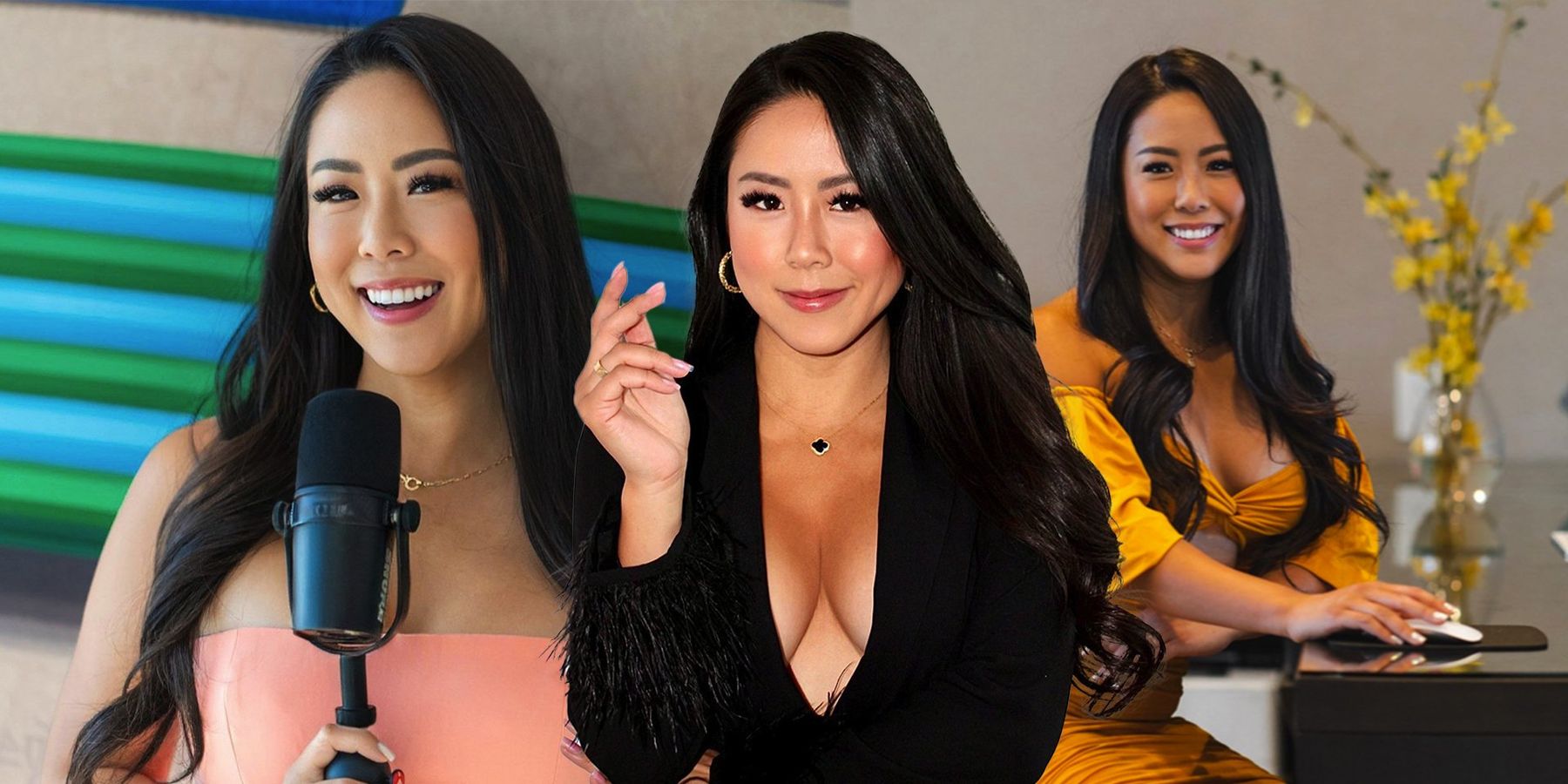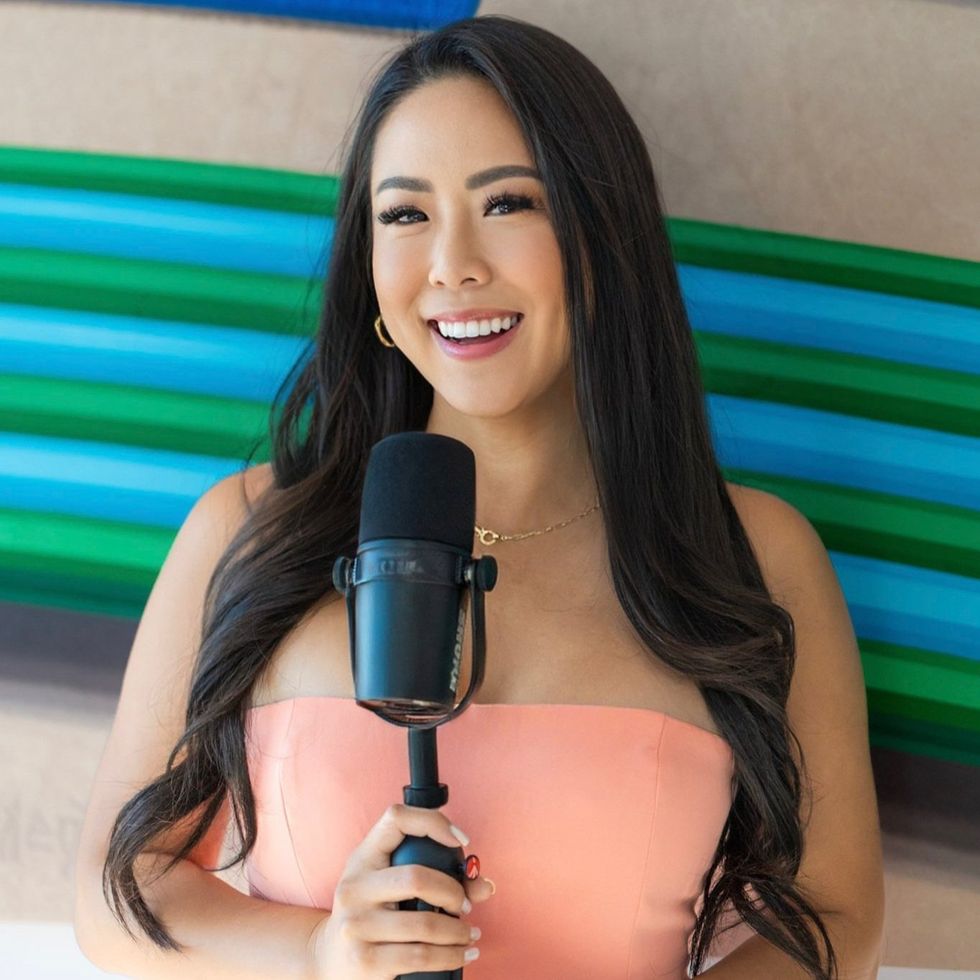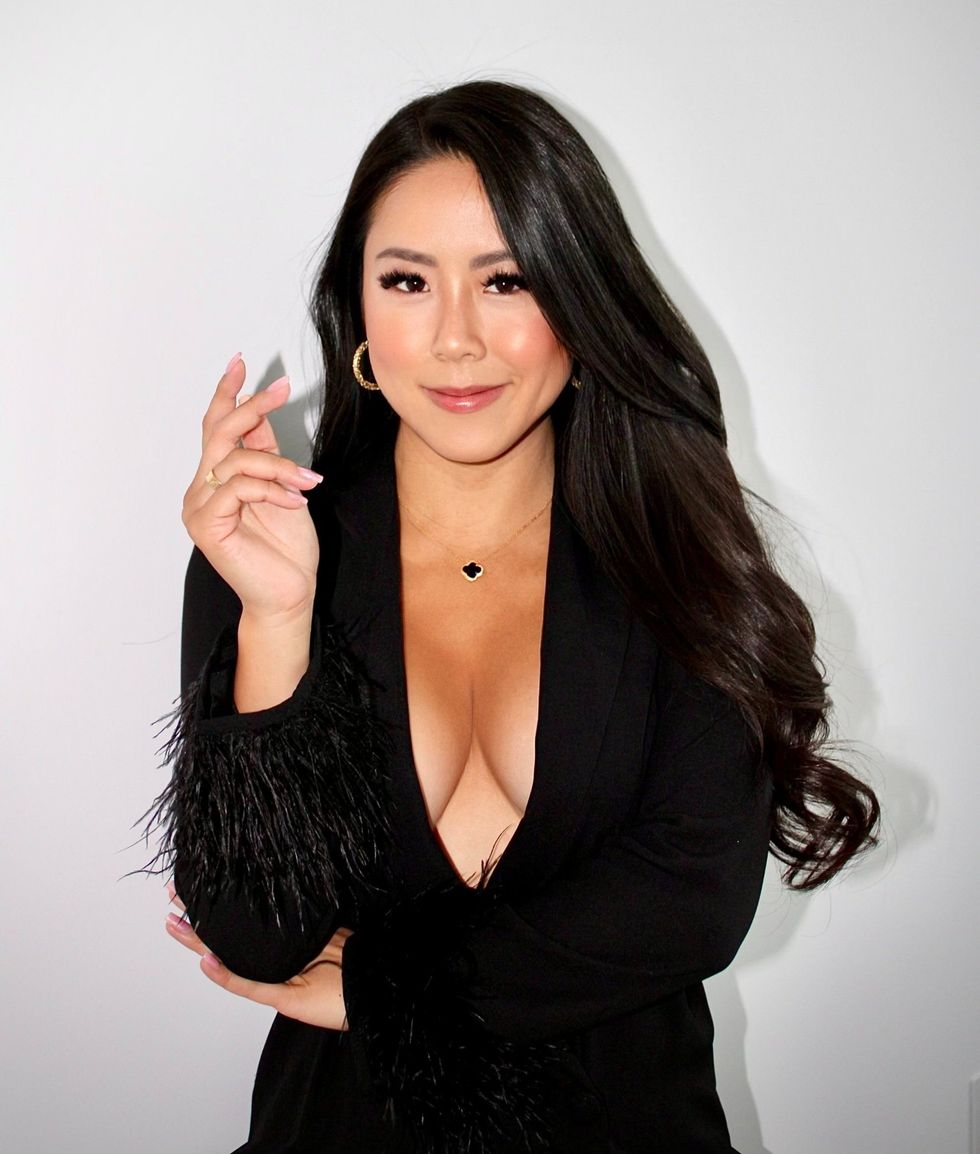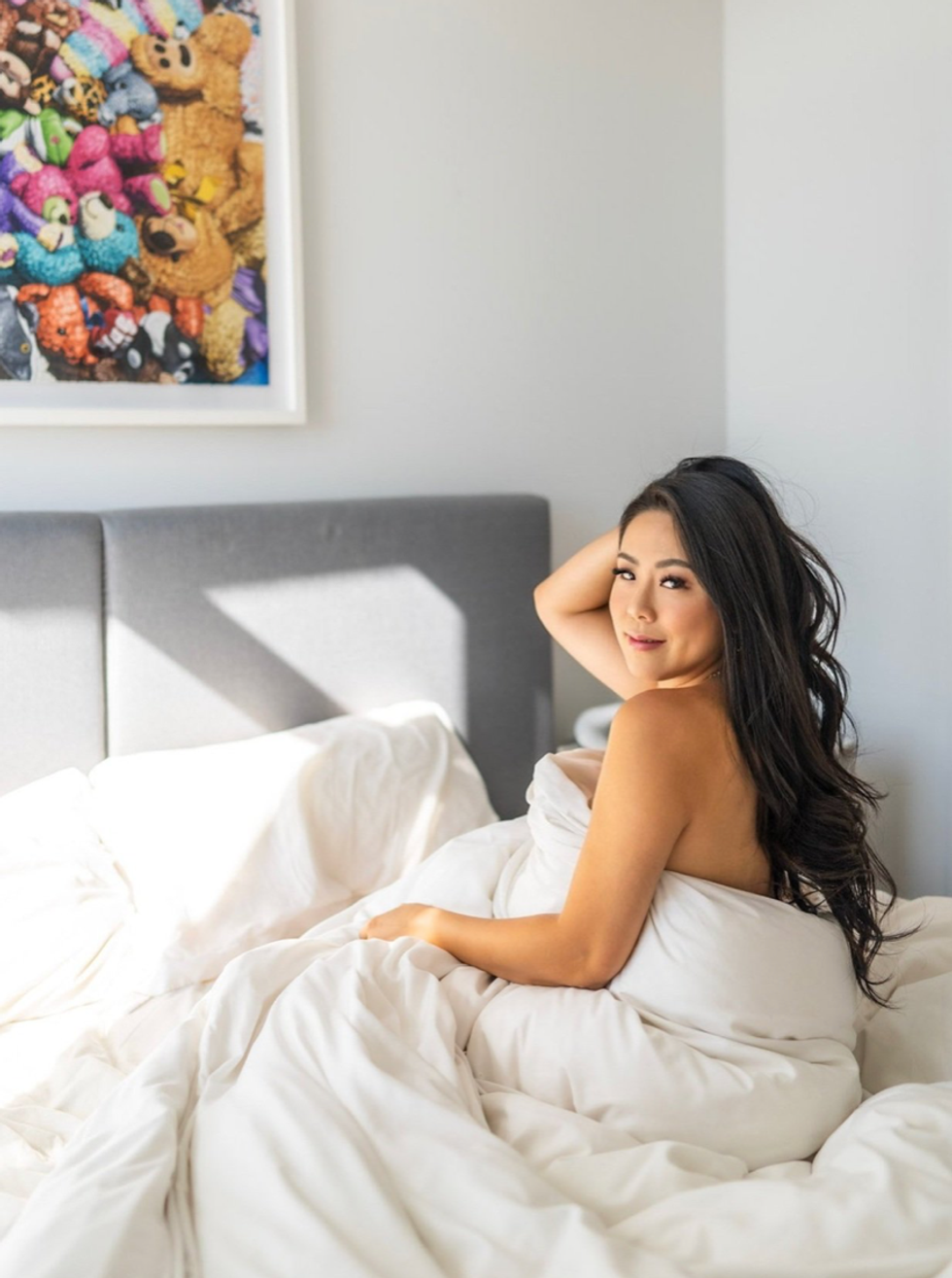
"Lick their nipples!" exclaims the peppy Dr. Tara in one of her many TikTok videos that has gone viral on the internet. The provocative nine-second clip, which emphatically prescribes viewers to "turn them on" with stimulating nipple licking, has attracted the eyes and ears of millions. "Yeah. Nipple lickin' good," Dr. Tara quips as a cheeky sign-off, exemplifying her unusually comedic approach to sex education content. The mixed tempered comments range from tickled and delighted to incensed and disgusted. Some commenters just seem turned-on...
All feed the impartial algorithm that has helped Dr. Tara grow her account's following from last year's few thousand to its current standing at more than two million. From queefing to pegging, Dr. Tara covers society's unspoken topics with empathy and humor.
Growing up in Bangkok, Thailand, Tara Suwinyattichaiporn spent her adolescent years as an inquisitive and horny teenager without anyone she could look to for her sex-related questions. Now, she's TikTok's most-followed sex expert, a go-to online resource for Gen Zers and Millennials looking for fun and digestible advice on sex and relationships. Her light-hearted (and bite-sized) content signals the newest wave of sex education — one that engages a generation that may only have five seconds to lend its ears. Don't worry, with expletives and raunchy jokes, Dr. Tara is sure to capture your attention in four.
When Dr. Tara isn't provoking the internet, she works as a tenured sex professor at Cal State Fullerton and running her interpersonal relationships business "Luvbites," where she functions as a consultant, TEDx speaker, podcast host, author and coach. Dr. Tara's main piece of advice for young people who are struggling with shame or guilt around sex is seeking out positive sex education content. Heed Dr. Taras sage words and "lick their nipples!"
Check out PAPER's interview with the internet's number-one sexpert Dr. Tara below.

How did you become TikTok's "sex expert?"
I'm a sexuality professor. I've been a professor for 12 years. I started my sex-positive media brand Luvbites two years ago. And I started to give more attention to TikTok last year.
Wow. A lot of growth since then.
It's insane. I started Luvbites because of my students. I love teaching in college because Gen Zs are so fun and they always have new terms that they teach me. They were like, "Dr. Tara, you are so fucking entertaining. You should be on TikTok." I didn't even know about TikTok. My students are my biggest fans. But yeah, it's blown up. I just looked at a screenshot from last April, when I had 90,000 followers. It's March now and we're at 2 million.
What do you teach?
I've always taught relationship classes. Like relational communication and interpersonal communication. I started teaching a sex class five years ago at Cal State Fullerton and it became one of the most popular classes on campus.
Did you ever study sexuality formally, or is it a personal passion that you decided to create curriculum for?
I would say it's both. I'm originally from Thailand. I grew up in a very sexually conservative environment. I went to an all-girls Catholic school, my principal was a nun. In that environment, if your skirt is one inch above your knee, you get hit on the hands. I grew up with a lot of shame when it comes to female sexuality. But I was always a very sexually curious kid. Actually, I was a horny little kid. I remember being nine or ten and using the bidet extra on my clit because it felt good. I didn't know it was sexual, it just felt good. I was always a person that was interested in pleasure and sexuality. However, I didn't have a vaginal orgasm until I was almost 30. My whole exploration in college and in my early 20s, I never had an orgasm. I faked orgasms throughout. And at some point I was like, Fuck, this sucks. I was so uncomfortable with my own sexuality. That triggered me to look into sexuality in graduate school.
As I studied relationships, I learned that sex is one of the top three issues for long-term relationships. It's universal, regardless of culture and religion. Everybody has a sex issue at some point in their lives. Then it clicked with me like, Damn, how come we haven't found a solution if it's such a big problem? It's like an epidemic that no one cared about. We had COVID and immediately all the top scientists in the world were looking into cures. This has broken so many marriages and relationships and there's no solution. Ever since then, I dedicated a lot of my time to understanding, reading, studying and researching sex and sexuality, particularly sexual satisfaction. How can we sustain long-term sexual satisfaction? What are some of the things that you can bring interpersonally to you and your partner or partners? What can you do for society, for your friends, for your family, for your children? Those are the three aspects of sex that I look at. So I would say it's a mix of personal passion and professional discoveries.

So when did the transition happen from "sex professor" to TikTok "sex expert?"
So my students were telling me, "You should have a podcast because you have so many friends in the sexuality field and we can learn from them." It's actually an assignment in my class, now, where they listen to an episode of my podcast and write a reflection paper. I've done the podcast since 2021. A few months after I started my podcast, my students were like, "You should have a TikTok." At the beginning, I didn't know how to translate an hour lecture into 15 seconds. Then, I hired a Gen Z assistant who I love dearly. We both workshop a lot of ideas and how it fits with my personality. He told me, "Tara, just the way you talk in person is so fucking funny. You should just talk like that." When I talk to my friend and I go, "Maybe you should just eat his ass!" he's like, "Why don't you just say that?"
Do you run into trouble with getting censored on social media platforms?
Yeah, I do get censored on TikTok and Instagram. Once every two weeks, there'll be one video that gets deleted. I still don't know what the logic is. I'll have a video where it's like, "Oh, you should eat her asshole." And that's fine. But then I'll have, "Here are three types of orgasms," and that will be deleted.
I often find a lot of the content that's getting banned is about female pleasure and not women acting provocatively. So that weirdly checks out for me.
Now that I think about it, I should collect data from over the year and see the videos that are deleted and what they're about.
I saw your recent TikTok about sex parties. Is that a scene you frequent in LA? And what advice do you have for people that are interested in exploring sex parties in their area?
I wouldn't say I frequent, but I definitely have a lot of experience. I've gone to them a lot. Now, we just got married and we're trying to have a baby. So I want to make sure I know who the father is! We're monogamish. So we're open to having sex with other people as long as there's consent and we talk in advance. So for us, going to a party is fine. Before I was in this relationship, I went to many. If that's something you're interested in, I highly recommend going once, or even twice, just to see what it's like and how you feel about it. Because the first benefit is that it helps you understand yourself more.
I have a client who went to a sex party for the first time and realized, Oh, shit, I'm actually really comfortable seeing naked dicks around me. This is a heterosexual male. So he's like, Wow, maybe I'm not that crazy hetero as I thought and I'm a little bit more fluid. After the second or third time, he had a guy going down on him. And now he's like, Okay, I'm hetero-flexible. Oh, yeah. Love that for you. So I think if anything, it's a huge self-exploration. Nothing like reading books. Experiential learning.
The second benefit is that it allows you to build confidence because you see variety. When you're just in your head and having sex with one person, you don't really see what's out there in the world. But when you're at a sex party, you're really exposed to so many people, so many interests, so many kinks. And it just makes you feel more confident because you have more knowledge.

With your sex class and your presence on TikTok, do you feel widely recognized and supported by your academic peers? Do you find that there's any stigma attached to being interested in this realm?
There's stigma. Academia is a conservative place. I know that it might seem counterintuitive because people think that academics are typically liberal. At my campus, for example, most professors will say they're liberal, right? But they're not liberal in this way. So when it comes to me and how I portray myself on social media, my department is supportive, but when I go to conferences, I can feel a little snubbed. I presented a paper at an international conference and I remember someone that went right after me said as a qualifier, like, "Oh, just so you know, this is not a paper like that."
Tell me more about the comedy aspect of your brand, because I see that your TikTok bio advertises both comedy and sex ed.
Yeah, so TikTok is very much advertising for me. I do love TikTok in that it gives me a platform to help people feel more comfortable about sex. Because I do meet-and-greets at college campuses, and recently, I was at UC Riverside and there was a group of 40 kids waiting in line to take a picture with me. Each of them expressed how grateful they are for the content and how it has helped them feel normal. Which, to me, is gold. And comedy is key in that. There's so many people I love in the sexuality realm. I love Esther Perel. But I think that a lot of 18- to 21-year-old kids perhaps don't feel like her content is as relatable. I use comedy to help bridge the gap of discomfort, distance and the unknown, because a lot of them haven't had sex. So to me, comedy is key. Comedy and sex ed should exist together, for sure.
"Gen Z is not having sex."
Have you found that there are differences between Gen Z and millennials in terms of their attitudes toward sex?
Oh, yeah. So there's three points of data that I'm thinking of. One would be TikTok and Instagram. Another is studies that I've read about Gen Z dating and sexual behavior patterns. And then another data point would be talking to my students. I think a major difference — and statistics show this — is that millennials had more sex than Gen Z. Gen Z is not having sex.
I am a cusp, born in '96. But, I can't tell you enough how true I find this to be.
So many big surveys and studies show that and my students tell me that and TikTok confirms that. It's also a lot of young men that are not having sex. Definitely millennials had more sex than Gen Z, but in terms of sexual attitude, Gen Z is championing an era of acceptance, especially when it comes to sexual orientation, attraction and expression. So I'm a big fan.

If there's an increase in acceptance and communication around different kinks, pleasure and experimentation in younger generations, and yet, young people are still not having that much sex — or finding people that they want to have sex with — it's almost like this weird Catch-22. Like, I'm willing to try all of these things... but maybe not with any of you.
Like, I'm willing to talk about it online, but not actually do it in person.
If there's one sexually adventurous thing that you wish young people would try or be open to, what would it be?
Can I do two?
You can do three.
Well, the first thing that comes to mind has a lot of research to back it up. Sexual meditation. I want Gen Zs to try sexual meditation. Gen Z is already susceptible to exploring mental health and wellness tactics and understanding what helps them in terms of self-care. So this is like that, but sex-related.
What is sexual meditation?
Sexual meditation is just like a regular meditation practice, but it focuses on sexual thoughts, feelings and sensations in the body. Research from the University of British Columbia has shown that sexual meditation helps men and women in helping with their sexual dysfunction, increasing sexual desire and reducing sexual anxiety. It's an amazing practice. I do it every single day, religiously. I love meditation in general, so I'm like, why not throw in the sex part?
If people are interested, I have a free guided five-minute sexual meditation on YouTube. But they don't have to use a guide, they can also just think about the last time they had great sex or even a scenario that they heard on audio porn. And then masturbate to it.
The second thing I want people to try is toys. For the longest time, as an older millennial, toys were not normalized during our young adulthood. Even though it is more normalized now, a lot of my students don't have toys. So I'm thinking is it an accessibility issue? Are they too expensive? But then there are bullet vibrators that are like $25.
And they're wearing $100 sneakers.
Yeah, exactly. But I would love for people to try toys because toys can bring a lot of pleasure to your sex life. And self-pleasure is so important in order to build your sexual self-esteem and empowerment. Because you can give yourself pleasure.
Photos courtesy of Dr. Tara
MORE ON PAPER
Fashion
Coolest Person in The Room: Alejandro Gómez Palomo
Story by Jay Choyce Tibbitts / Photography by Diego Villagra Motta